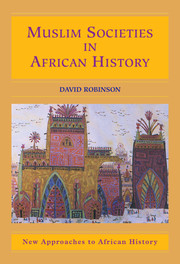CONCLUSION
Published online by Cambridge University Press: 05 June 2012
Summary
In this book I have examined a range of Muslim societies in African history, from large to small scale, over the long and short term, and in general and very specific ways. Throughout I have sought to show the variety and originality in Islamic practice in Africa. This does not mean that there are “Islams” in Africa in the plural any more than there are “Islams” or “Christianities” in the world. The common core of Islamic belief and practice remains. Millions of Muslims make the pilgrimage to Mecca to express this unity. Millions more in their homelands celebrate the “birthday” of the Prophet every year.
But there are certainly different Islamic religious cultures in Africa. Uthman dan Fodio, discussed Chapter 10, would have been critical of the “fatal compromises” of the Suwarian tradition of Chapter 9. The Mahdi of the Sudan would have rejected them even more quickly. But they were working from an assumption that they lived in the Dar al-Islam, at least in areas that had been part of the Dar al-Islam. This sense of “Islamic country” might come from the affirmations of sultans that they were ruling in the name of the faith. It might come from speaking or learning Arabic, the language of the Quran and Muslim origins, or even from speaking Swahili, Hausa, or Fulfulde, languages with strong infusions of Arabic words – especially for religious practice.
- Type
- Chapter
- Information
- Muslim Societies in African History , pp. 197 - 210Publisher: Cambridge University PressPrint publication year: 2004

